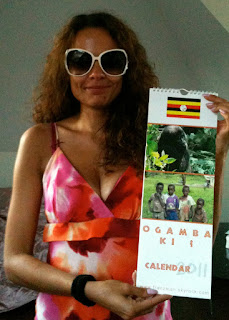
As the train stopped, I felt as if I had travelled back in time.
Stoke On Trent stands the rough English wind with its five storey buildings painted in a dull yellow and the deserted roads.
If this city will be ever remembered, it might be because it’s the birthplace of Robbie Williams from Take That and because Slash from Guns & Roses used to live there.
However, after meeting Franz Opitz in this place half way between London and Manchester, I now wonder if one day it might be associated with him too.
It’s only now that Franz has left and I’m waiting for my train to London at the grotty café at the station that I start to understand his personality and sense of humour.
I can’t help but smile as I notice the picture on the calendar he has given me as a gift.
“Hey You Sexy Thing! Morning Hygiene Routine in Bukuya“, it reads below the picture of him having a bucket shower in Uganda, where water still remains an issue.
The calendar features pictures taken by Franz during one of his stays in Uganda and can be bought here at £ 6.50 for the slim line version and £ 8.50 for a larger A3 version with more photos and amusing text.

All contributions will help make Michael’s future brighter.
But let’s start from the beginning.
Franz is a man who’s had all most people want from life.
When the company he used to work for as a managing director made him redundant, he decided that the time to give something back had come. He just wasn’t going to spend the rest of his life doing some gardening or sipping wine in a posh restaurant.
“I had no interest in spending my days cruising the Mediterranean in front of a cocktail,” he told me.
This becomes hard to even imagine as he shows me impressive pictures from Uganda, a mix of beautiful sunsets, ugly wounds, poverty and local folklore.
When he’s in Uganda, Franz doesn’t mind waking up to a cold bucket of water rather than floating in a hot tub and he doesn’t mind the conditions he has to take care of in the several clinics he visits.
Most of his patients are kids who get easily burned as hot food is cooked outdoors with no adequate protection and there are many accident wounds too because the streets are unpaved and in terrible conditions.
When Franz tells me about his previous life I truly struggle to picture him as a successful businessman in a suit and tie in a meeting room.
“I have travelled a lot, both for business and independently. I have also always been involved in volunteering abroad,” he explains while we have a coffee at the hotel in front of the station.
“When I was still in work, I used to be an expedition leader for the youth charity Brathay. Being made redundant in 2006 gave me the opportunity to reorganize my life again. “
He was 59 at the time and he decided to qualify as a paramedic. At first Franz, who is originally from Germany but moved to the UK 37 years ago tried to volunteer in Stoke.
“It’s terribly bureaucratic to get involved in England so in the end I chose to volunteer in Uganda. It was one of the few places where I had never been and I had no contacts there unlike in other African countries. Uganda is also one of the most backward nations in Africa.”
Franz was even more stimulated by these challenges and he started from the capital, Kampala to then visit several clinics in the country to help those in need.
 When he travels to Uganda, he makes sure he carries a lot of medicines with him.
When he travels to Uganda, he makes sure he carries a lot of medicines with him.
What strikes me more about him is the way he approaches Uganda and Africa more in general.
He’s not paternalistic but objective.
He’s not a dreamer but a pragmatist.
“Malaria is a disease that could be curtailed simply by having people sleeping under mosquito nets,” he tells me.
“A mosquito net costs 3£; I have calculated that you’d need about £100m to buy enough mosquito nets for the whole of Uganda. If the government over there stopped being corrupted for just a week, this would be enough to solve the problem.”
I can’t help asking him what he thinks about the attention recently given by the media to the fact that Cheryl Cole got malaria.
“Pathetic”, he says.
I guess both if you have common sense and if you have spent the last few years travelling back and forward from Uganda, this is what you’d say too.
Franz takes people at heart.
He has just sorted out the visa for a 22-year-old student, Michael who in a few weeks will fly for the first time from Uganda to the UK to start university.
“Michael used to be my translator in Uganda. He’s the kind of person who’d never ask me for anything. Even when he saw my mobile phone, he never cared about it or about any other of my possessions.
I want him to have the opportunity to study here so that when he goes back to Uganda he will get a good job and make the difference. “
Franz is funding Michael to have a better education that he could ever have in his native country. Not only.
He’s already planning, in three or four years, to go back to Uganda with Michael to be his mentor and help him putting a foot in the difficult and highly corrupted job market of Uganda.
There are parents who wouldn’t do that much for their own son.
“Michael will study IT for business solutions and when he goes back to Uganda his qualifications will mean a lot. He might start his own business or get a good job there.”
At this point the hotel is getting busy for a wedding party and Franz and I have gone from coffee to launch. While Franz is having his meal I can’t stop asking questions so I decide to take a cigarette break at least he can finish his jacked potato in peace.
But there’s so much to ask and he has a lot of stories to share, some hilarious, some upsetting, but all interesting. He makes you truly want to visit Uganda.
But there’s also a lot of anger when Franz speaks about the rooted issues of the country that by now he knows very well.
Franz also talks with resentment about the hypocrite help that the West is giving to Africa while at the same time he’s not afraid of denouncing the laziness that this instigates in the poor populations of most African countries.
“The West must immediately stop aids to Africa,” he says. “We must give Africa access to the EU market, instead. Writing off the debt of Africa is pointless if we continue to block the continent’s access to our market.”
He’s patient when he explains the dirty face of the policies that Western governments have in place to deal with the troubles of Africa.
“Take Tanzania, for instance. Coffee growers are not even allowed to send their finished coffee to Europe. They can only send raw beans. This is all to the disadvantage of Tanzania and to the advantage of the European markets. Because most African countries don’t have agreements in place with EU governments, they would have to pay a very high duty tax to export their products, textiles for instance. Our aid to Africa is actually very self-centred and nothing does but feed local corrupt governments.”
Franz is very clear about what Uganda and the rest of Africa needs:
“We must give Uganda the technical know how, the training and the equipment needed for proper development. We must send trained people over and welcome foreign students in the UK. They can get a better education here and then go back to Uganda and improve their own country. This is where our money should be spent on, other than in ridiculous wars such as Afghanistan. The way poverty in Africa is being dealt with at the moment is a colossal waste of money.”
And what Franz says is a plan that he’s already making happen by helping Michael.
When I listen to Franz, I feel silly about some of my every day petty problems.

I think meeting Franz has meant a lot to me.
It’s given me back a bit of the innocence and trust in the world that I had lost in the past months. I am looking forward to meeting Michael now.
Even if this will mean having to come back to Stoke On Trent.
 I’m logistically challenged and it took me about an hour to get to the Brazilian Embassy for the private viewing of the pictures of Gilberto Gil by André Camara.
I’m logistically challenged and it took me about an hour to get to the Brazilian Embassy for the private viewing of the pictures of Gilberto Gil by André Camara. 










